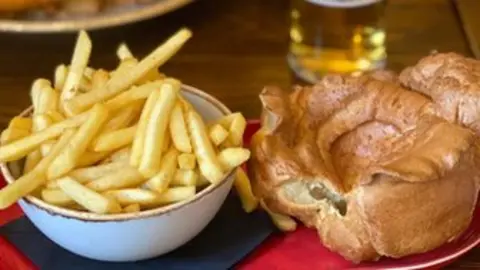Covid smell loss 'ruins Christmas lunch'
 Getty Images
Getty ImagesCovid has ravaged many Christmas traditions. For people suffering from anosmia or parosmia - a loss of smell or distortion of scents and tastes - it has also robbed them of a feast of festive pleasures.
The piney aroma of Christmas trees, the welcoming wafts of mulled wine and hot mince pies - all are replaced with nothingness or a stench so vile it is hard to describe.
This is the reality of Covid smell loss for thousands of people, many of who are several months on with little or no improvement in their senses returning to normal.
'Like wet dog'
 Jess Boyes
Jess Boyes"For me some things are just absolutely horrid," says Jess Boyes, from Halifax.
"It's like eating gone-off meat that has been left festering in the bin with some fish and stale body odour on top."
The 25-year-old had suspected coronavirus in March and developed distortions - known as parosmia - in September.
She says the condition has turned her favourite Christmas smells - oranges and clementines - into something resembling a "wet dog".
"I'm really struggling with it all, especially when everyone is talking about food and drink," she adds.
'Smell of happiness'
Elizabeth Dunn works in Cairo, Egypt, but after quarantining, will spend Christmas at home in Bradford with her four children and grandchildren.
She had the virus in May and is still suffering shortness of breath and smell loss, known as anosmia.
"Christmas smells are my favourite," she says.
"I try and close my eyes and recall the heavy smell of the turkey in the oven, Brussels sprouts, satsumas, the smell of happiness all around."
After a "long, hard year" away from her family, the 60-year-old says not being able to smell her grandchildren will be the hardest.
"When you hold them in your arms the first thing you do is sniff, they each have their own wonderful smell.
"My eyes fill up thinking I won't get that wonderful baby fragrance of my youngest."
'Shut off from Christmas'
For many sufferers, anosmia and parosmia are becoming a serious mental health issue, says Chrissi Kelly, founder of smell loss charity AbScent.
With so many festive memories connected to smell, she says the group's Facebook support page has seen posts rocket in the run-up to Christmas.
 Jess Boyes
Jess Boyes"Breathing in the atmosphere of the decorations, taking in the crisp winter mornings or the wafts of roast potatoes in the oven," she says.
"When you lose your smell, suddenly you're shut off from all those experiences."
And anosmia's ugly sister, parosmia, can be an even more difficult condition to bear.
Ms Kelly said: "Imagine taking all that happiness and joy those wonderful smells would normally create and then think of your worst possible smell - be it rotting flesh or poo - and dump it on top.
"It's the final insult."
'Hoping for a miracle'
 Kate McHenry
Kate McHenryKate McHenry and Pasquale Hester are on a similar timeline. They lost their smell and taste from suspected coronavirus in March. Both senses returned briefly before the distortions emerged.
Foods and drinks they once adored now seem permanently changed.
Chicken resembles "sulphur", gin and tonic tastes like "sickly perfume", coffee a "really bad pot pourri". After nine months, they are hoping for a Christmas miracle.
Kate, 37, from Widnes in Cheshire, said: "Christmas day I'll probably have spaghetti on toast.
"At the minute I'd be happy if a glass of prosecco and a slice of toast just tasted anywhere near normal, never mind a full Christmas dinner."
 Pasquale Hester
Pasquale HesterNo food is enjoyable for Pasquale - it is all about figuring out what is "just manageable" as opposed to not wanting to vomit.
"There's absolutely no enjoyment in what I'm eating. Nine months on and I've had to go through a grieving process to accept where I am."
The emotional consequences of the sensory changes are staggering, as can be seen by the anguished posts in Abscent's Facebook group.
Becoming a 'sensory detective'
Dr Duika Burges Watson is part of the Altered Eating Research Network, which addresses difficulties around food and eating when sensory systems have changed.
She has drawn up a paper with fellow professionals highlighting how Covid taste and smell issues have severely disrupted daily life and affected psychological health.
"It is deeply distressing to experience," she says.
"It takes a huge mental shift to think about different ways in which you can enjoy food when you're experiencing such profound issues."
But interventions can help to make food more palatable.
"We encourage people to become sensory detectives, to learn to appreciate things like texture, colour, different levels of sour and bitter," Dr Burges explains.
"Although when you're in the critical stage of parosmia it's impossible to appreciate the texture of something which tastes like raw sewage.
"In cases like that it might be useful to eat with a nose clip on or in the very least drink unflavoured protein shakes."

Tips for coping with parosmia
- Eat room temperature or cool foods
- Avoid fried foods, roasted meats, onions, garlic, eggs, coffee and chocolate. These are frequently mentioned as the worst foods for parosmics
- Try bland foods like rice, noodles, and untoasted bread. Steamed vegetables and plain yogurt are palatable to many.
- If you really can't keep food down, consider unflavoured protein shakes
(source: Noswell, AbScent)

'Don't face it alone'
While medical treatment is still not forthcoming, parosmia is considered a sign that the olfactory nerves damaged by the virus are starting to regenerate.
Meanwhile, the focus is on support and advice on how to make everyday life more bearable for sufferers.
Ms Kelly has done a series of Facebook live broadcasts to help with emotional well-being.
"An altered sense of smell at Christmas is a very difficult experience," she says.
"It is even more frightening because people don't know if it's permanent and even the doctors don't have the answers.
"We are here to make sure no-one has to face it alone and to keep pushing for answers that will give people hope."
